Iran Calls On Islamic Countries To Sanction Israel
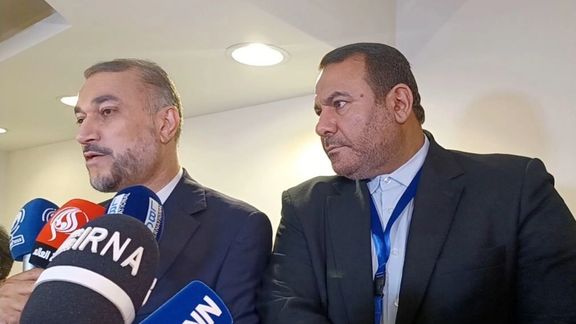
Iran says members of the Organization of Islamic Cooperation (OIC) should impose an oil embargo and other sanctions on Israel and expel all Israeli ambassadors.

Iran says members of the Organization of Islamic Cooperation (OIC) should impose an oil embargo and other sanctions on Israel and expel all Israeli ambassadors.
Iranian Foreign Minister Hossein Amir-Abdollahian made the remarks Wednesday on the sidelines of the OIC’s urgent open-ended extraordinary meeting to discuss the escalating Israeli-Palestinian conflict. The meeting is taking place in the Saudi city of Jeddah to after a blast at a Gaza hospital late on Tuesday killed large numbers of Palestinians.
"The foreign minister calls for an immediate and complete embargo on Israel by Islamic countries, including oil sanctions, in addition to expelling Israeli ambassadors if relations with the Zionist regime have been established," the foreign ministry said in a statement.
Amirabdollahian also called for the formation of a team of Islamic lawyers to document potential war crimes committed by Israel in Gaza.
Prior to the blast at the Gaza hospital on Tuesday, health authorities in Gaza said at least 3,000 people had died during Israel's 11-day bombardment that began after a Hamas October 7 rampage on southern Israeli communities in which 1,300 people were killed and around 200 were taken into Gaza as hostages.
Iran’s ruler Ali Khamenei downplayed the killing of Israeli civilians in a speech on Tuesday, saying they were armed, and that Israel has killed many more Palestinians.
The Islamic Republic, led by the 83-year-old authoritarian ruler, has been financially and militarily supporting Hamas, the Lebanese Hezbollah and other militant organization designated as terrorist groups by several Western countries. The government ordered street celebration and vowed to continue support for Hamas.
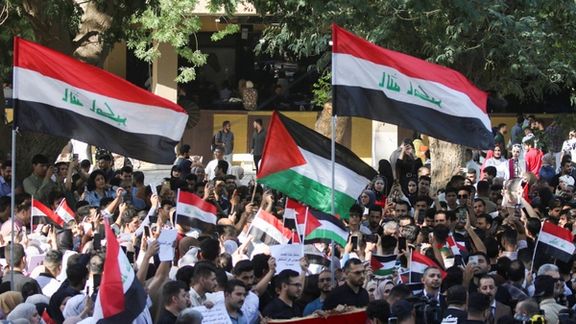
Amid threats, the US military thwarted an attack targeting its forces in Iraq early on Wednesday, intercepting two drones, Reuters quoted US officials as saying.
The attempted attack was the first in more than a year and comes after Iran’s proxies in Iraq made threats following the Israeli bombing of Gaza in the wake of the October 7 Hamas attack.
The officials, who spoke to Reuters on condition of anonymity, declined to say who was suspected of the attack but Washington is on heightened alert for activity by Iran-backed groups amid soaring tension in the region over the Israel-Hamas war.
Last week, Iraqi armed groups controlled by Iran threatened to target US interests with missiles and drones if Washington intervened to support Israel's conflict with Hamas in Gaza.
The one-way attack drones were intercepted as they attempted to strike Iraq's al Asad air base, which hosts American troops, the officials said.
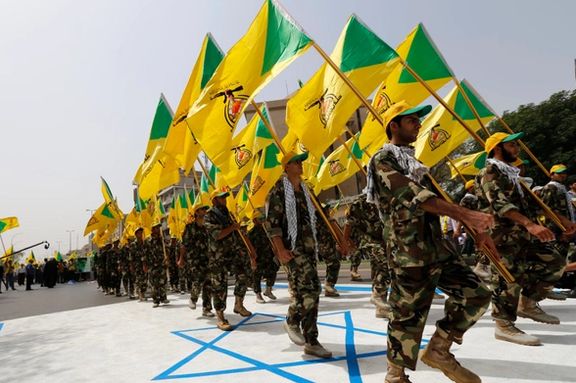
The attack came hours after a strike on a Gaza hospital killed hundreds of Palestinians, raising the stakes for US President Joe Biden as he flies to Israel on Wednesday to signal support for its war against Hamas.
Israel blamed the blast at Al-Ahli al-Arabi hospital on a failed rocket launch by the Palestinian Islamic Jihad group, which denied responsibility.
Palestinian officials said an Israeli air strike hit the hospital, with the Palestinian Authority's health minister accusing Israel of causing a "massacre".
In Iraq, tension over the war in Gaza had already been high. Its top Shi'ite cleric, Grand Ayatollah Ali al-Sistani, last week condemned Israel and called on the world to stand up to the "terrible brutality" in Gaza.
Leaders of Iraqi armed groups blamed Israel for the attack on the hospital. Some of them condemned the US for supporting Israel.
Kataib Hezbollah, a powerful armed faction with close ties to Iran, said that the United States, which is supporting Israel in "killing innocent people", should leave Iraq.
"These evil people must leave the country, otherwise they will taste the fire of hell in this world before the afterlife," the group said in a statement last night.
Iraqi politician Hadi Al-Amiri, leader of the political and military group the Badr Organization, which is close to Iran, also blamed Israel for the attack on the hospital and described it as "the massacre of the era, which can only be classified as a war crime" and condemned the US and Western countries for supporting Israel.
We “will not hesitate to consider America and the West as partners in this hideous massacre”, he said in a statement on Tuesday night. Last week he threatened to target US interests if Washington intervened to support Israel.
The United States currently has 2,500 troops in Iraq - and an additional 900 in neighboring Syria - on a mission to advise and assist local forces in combating Islamic State, which in 2014 seized swathes of territory in both countries.
In past years, Iranian-backed militias in Iraq regularly targeted US forces in Iraq and the U.S. embassy in Baghdad with rockets, though such attacks have abated under a truce in place since last year, as Iraq enjoys a period of relative calm.
US officials have accused Kataib Hezbollah of previous attacks on US interests. The group has denied the claims.
Dozens of members of the Popular Mobilization Forces (PMF), the state paramilitary organization that contains many Iran-backed factions, took to the streets on Tuesday to condemn the hospital attack.
Demonstrators chanted anti-US and anti-Israeli slogans and said they wanted to storm the US embassy for its support of Israel.
A Reuters witness said that some of the protesters tried to cross the bridge that leads to the fortified Green Zone - home to the US embassy and other missions in Baghdad - but were blocked by the security forces.
Reporting by Reuters
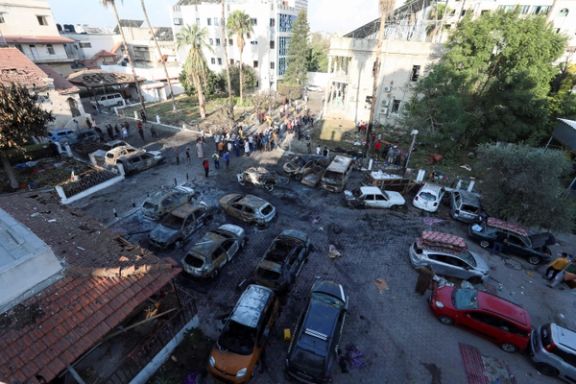
The United Arab Emirates was among the first states to name Israel as responsible for the bombing of a Gaza hospital as the threat of Iranian action looms larger.
Iran has been fiercely critical of states such as the UAE and Bahrain for normalizing relations with Israel, in the wake of the US-brokered Abraham Accords in 2020 and the UAE has trodden a fine line to keep the balance between its new and old friends.
The UAE reinstated diplomatic relations with Iran last year, following tensions due to the war in Yemen where Iran’s proxy, the Houthis, was at war with the UAE and Saudi-backed Yemeni government.
The fine line the country, seen as the Middle East’s Switzerland, walks became was no less apparent as its foreign ministry announced just hours after the attack on the Al Ali Baptist Hospital in Gaza announced its “strong condemnation” of the attack, naming Israel as the perpetrator.
Meanwhile, in Tehran, protests were being prepared with the regime’s leaders organizing free food and drink for those coming to the streets in support of Gaza and “down with Israel”, an easy sell while the people of Iran are being pushed more rapidly below the poverty line.
The regime grows each day more vocal about pulling the cord on unleashing a region wide war with its proxies on each side of Israel, in Gaza, Lebanon and Syria.
Fanning the unrest President Ebrahim Raisi said: “The flames of US-Israeli bombs dropped tonight on innocent Palestinians being treated for injuries in Gaza's hospital will soon engulf the Zionists. No free human being’s silence is permissible in the face of such a war crime. Iran, as a part of the Islamic nation, is grieving.”
Israel claims the tragedy was a misfired rocket from Gaza-based Islamic Jihad, the resulting tragedy due to the hospital having been hiding massive amounts of munitions and explosives.
Earlier this week, fake news spread across social networks claiming four Israelis had been murdered in a terror attack in Dubai. The emirate’s media office came out with an unprecedentedly fast denial of the incident calling it fake news, a crime in the Persian Gulf state.
With hundreds of thousands of Israeli tourists flooding into the country since the diplomatic ties opened and trade (excluding software) between Israel and the UAE in the first eight months of 2023, reaching $2.112 billion, up from $1.623 billion in 2022, there is a lot at stake.
The fake news which had already gone globally viral suggested the hand of Iranian cyber tactics to destabilize the country’s growing Israel and Jewish ties. Earlier this year, Abu Dhabi opened the region’s first synagogue in over 100 years at the Abrahamic House, a complex housing a mosque, church and synagogue side by side in a symbol of the togetherness of the region’s ancient religions.
Commentators have decried the Arab world’s silence over the atrocities caused by Hamas’ invasion of Israel on October 7, when the terror group massacred hundreds of civilians and took at least 200 more hostage.
Hussain Abdul-Hussain, research fellow at the Foundation for the Defense of Democracy, said: “Had Arab governments and protesters shown similar outrage against Hamas and demanded its end after October 7, I don't think Israel would have gone to war in the first place.”
Others saw through the potential political gain the hospital attack would garner, succeeding in Jordan’s canceling of meetings with President Joe Biden. Shahram Kholdi, a Middle East specialist, wrote: “Islamic Jihad Of Palestine’s long record of crimes makes them the prime suspect in the rocket attack on Gaza Baptist Hospital with the clear intention of sabotaging [the] Amman Summit between Biden and Arab leaders.” The summit was supposed to unite the leaders of the UAE, Jordan, Palestine and Egypt.
Furthermore, alongside providing tens of millions in aid to Gaza during the ongoing conflict, the UAE Red Crescent has utilized its substantial resources, which represent the country's most influential diplomatic asset. This organization has established 26 donation centers, and volunteers have joined in large numbers, underlining the continued surge of solidarity with the Palestinian cause, even in the face of the agreements.
Even at the level of the country’s royals, the allegiance is clear, putting the UAE in a challenging position each time conflict breaks out between Israel and the enemies on its borders.
Olympian Meytha Al Maktoum, part of the Dubai ruling family, has been actively supporting Gaza on social media this week, while in Sharjah, the wife of its ruler, Sheikha Jawaher Al Qassimi, has also been actively sharing posts in support of the Palestinians in Gaza. There has been no condemnation of terror group Hamas.
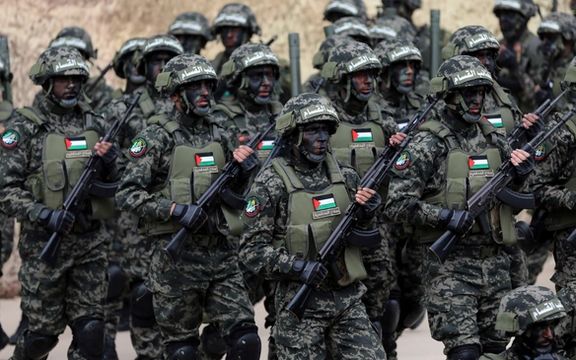
Iranian officials, including Supreme Leader Ali Khamenei and military commanders, continue threatening Israel while Israel is preparing for a possible ground offensive.
In one such threats, Ali Fadavi, the outspoken deputy commander of the IRGC, warned that Israel might face another surprise from Hamas if it proceeds with a ground offensive in Gaza.
Khamenei in a speech on Tuesday made indirect threats, saying that Muslims everywhere are angry, and it might be hard to control their reactions if Israeli ground forces enter the Gaza Strip. He also dismissed the issue of more than 1,300 Israeli civilian deaths, saying that even more Palestinians have been killed.
Israel awaits the arrival of US President Joe Biden on Wednesday in a bid to contain the conflict and prevent other players, such as Iran and the Lebanese Hezbollah, from getting involved.
In the meantime, in a video on social media an Iranian individual, most likely an IRGC officer in southern Lebanon is heard speaking in Persian "begging someone for something" over the phone or wireless radio. This is not the only indication that there are probably Iranians on the northern and southern borders of Israel helping the Lebanese Hezbollah and the Palestinian Hamas.
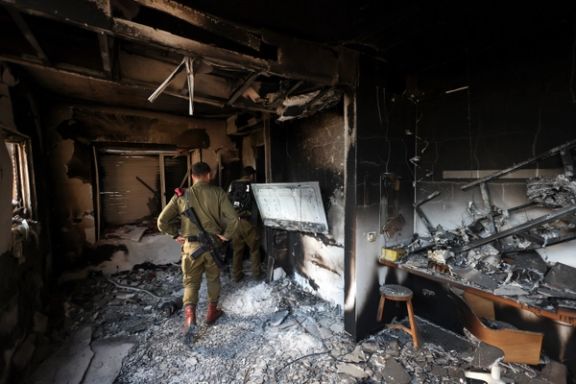
In Tehran, the hardline Farhikhtegan newspaper has reported without giving any sources or evidence that the US government has sent a message in writing to Iranian officials via Amir Saeed Iravani, the Islamic Republic's UN envoy in New York, calling on Iran to help contain the conflict over Gaza.
According to Farhikhtegan, the letter sent by the US government has four paragraphs three of which are about containing the conflict and preventing it from spilling into the region, and the fourth paragraph is a warning to Iran that if it enters the ongoing war, the United States will also become a party to the conflict. Since the October 7 Hamas attack on Israel, many observers have stated that if the United States enters the war, that would be a war against Iran and Hezbollah.
In another development, Acting IRGC Commander Ali Fadavi said on Tuesday that if Israel insists on carrying out a ground operation in Gaza, it will face another big surprise. This was a clear threat that Hamas operatives might attempt to enter Israeli territory once again or other Iranian proxies might open new fronts against Israel. Iranian officials have repeatedly issued the same threat during the past week.
In the meantime, news agencies quoted senior Hamas leaders as saying that non-Israelis held by Hamas in Gaza are not hostages and that they are likely to be released. However, those reports did not elaborate on how many foreigners have been taken hostage, and when, where and how they are going to be released. The reports simply said that foreign hostages will be released as the situation warrants. Promises to release the hostages are usually tactics to delay a major assault.
The Lebanese Hizballah also released a statement reporting that its forces have attacked IDF vehicles Tuesday morning at the border between Israel and Lebanon, the government-owned Iranian Students News Agency (ISNA) reported.
Meanwhile, Al-Mayadin TV in Lebanon, which is linked to the Iranian government, reported on Tuesday that "Resistance forces" have targeted Israeli espionage devices near the border.
Al-Mayadin also reported that two Hezbollah gunmen have been killed in a conflict with Israeli forces Tuesday morning.
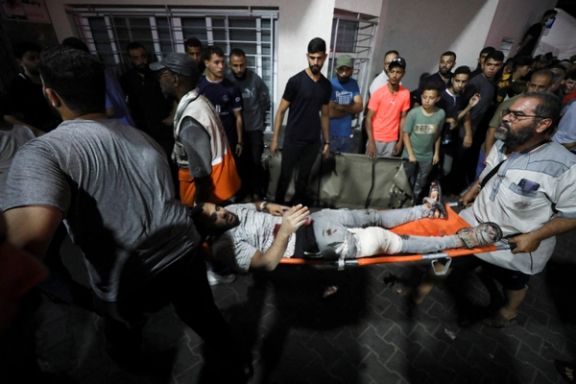
Israel's military denied responsibility for an attack on a Gaza hospital on Tuesday, saying it was hit by a failed rocket launch by the Palestinian Islamic Jihad group.
"An analysis of IDF operational systems indicates that a barrage of rockets was fired by terrorists in Gaza, passing in close proximity to the Al Ahli hospital in Gaza at the time it was hit," a spokesperson for the Israel Defense Forces said in a statement.
"Intelligence from multiple sources we have in our hands indicates that Islamic Jihad is responsible for the failed rocket launch which hit the hospital in Gaza."
Islamic Jihad militant group later denied the allegation that it was responsible for the tragic incident.
The attack on Baptist Hospital in Gaza, whose casualties is between 500 to 1,000 people according to different sources, has drawn condemnation of Israel with Hamas calling the attack a "genocide" and a "new turning point."
Russia and the United Arab Emirates have requested an urgent meeting of the United Nations Security Council on October 18, Russia's Deputy UN Ambassador Dmitry Polyanskiy said.
Jordan's foreign ministry also issued a statement on Tuesday strongly condemning the attack on the hospital, urging international protection for the Palestinian people and called on immediately joining efforts to stop the war from raging in Gaza.
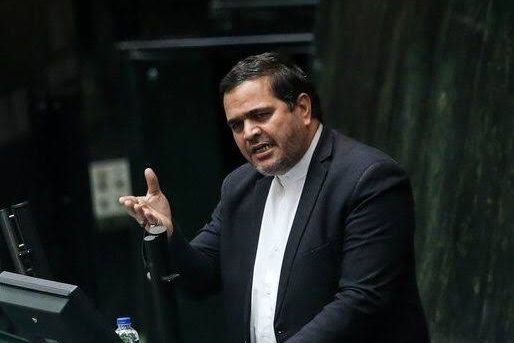
Iranian MP Ali-Asghar Annabestani has warned of the mobilization of Iran's proxies around the region should there be an Israeli ground invasion of Gaza.
While he said activating those on Israel's borders with Syria and Lebanon "is conceivable", more alarmingly, he mentioned mobilizing Iranian proxy forces even beyond Israel's borders.
"Moreover, the entry from other fronts of the resistance, both in Iraq, like the Nujaba movement and the Popular Mobilization Forces, and the resistance forces in Yemen, is conceivable to enter the field and deliver an unforgettable blow to the Israelis," he said.
His statement underscores Iran's commitment to support various terror groups aligned with its interests in the Middle East and their potential involvement in the war.
Mohammad Hossein Asfari, another Iranian MP, revealed the depth of Iran's involvement in the conflict through its proxies, which it terms 'resistance forces', even though it continues to deny responsibility for Hamas' war on Israel which broke out on October 7. Iran-backed Hamas terrorists infiltrated by land, air and sea, killing hundreds of civilians including babies and families.
Asfari claimed: "We are prepared for all scenarios, and responses [to a ground invasion] have been pre-planned. If they step one meter into the Gaza borders, the resistance forces will undoubtedly execute the predefined scenarios in various parts of the world."
On Tuesday, German Chancellor Olaf Scholz joined other western nations including the US and UK in issuing a direct warning to Hezbollah and Iran not to intervene in the ongoing conflict.
"Together with our allies, we as the German government are doing everything in our power to ensure that this conflict does not escalate further," he added.